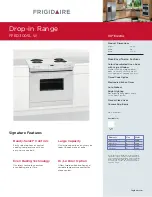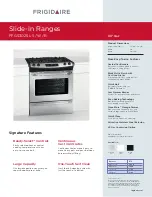
5
Installation Preparation
Professional Gas Cooktops
Installation
Options
These cooktops can be installed in standard
24" or deeper 25" cabinets.
• In 24" deep cabinets, the front of the
cooktop will project approximately 1-7/8"
beyond the front of the countertop.
• In 25" deep cabinets, the cooktop will be
flush with the front of the countertop.
• The stainless surface of the cooktop will be
1/2" higher than adjacent countertop.
26-5/8"
12"
1/2"
8-7/16"
Countertop
Level
22-3/4"
23-1/4"
3" to Center Line
of Gas Inlet
2-1/2"
Cabinet Face - Projecting Control Panel
Cabinet Face - Flush Control Panel
1/2"
Low Back
21-1/4"
High
Back
1/2" Above Adjacent
Countertops.
Front Projects Outward as Shown
From Standard Depth Cabinets.
Cooktop
1/2" Above Adjacent
Countertops.
Front Flush With Cabinets - a Minimum
of 25-3/4" Cabinet Depth Required
Flush With Cabinet Front
Cooktop
Advance
Planning
Refer to “Dimensions and Clearances” for
appropriate placement and necessary clear-
ances when planning the installation.
• Cabinetry can not be installed directly above
the cooktop.
• These cooktops require the installation of a
vent hood, 30" to 36" above the surface.
–The vent hood must be at least 24" deep.
–The vent hood must be the same width as
the cooktop.
–The 48" vent hood must provide at least
800 CFM and up to 1200 CFM.
–The 36" vent hood must provide at least
600 CFM and up to 800 CFM.
– When installing a cooktop that includes a
grill, select a blower on the high end of
CFM recommendation.
• Working areas adjacent to the cooktop
should have 18" minimum clearance be-
tween countertop and cabinet bottom.
• Clearance between cooktop and side wall or
combustible material must be at least 12" on
each side.
• These cooktops require 8" free space below
the countertop.
• If the cooktop is installed in an island:
–Allow 12" min. clearance at the back to
combustible materials.
–Allow 36" min. above the cooking surface to
combustible materials.
• Installation must conform with local codes. In
the absence of local codes, the gas cooktop
must comply with the National Fuel Gas Code,
ANSI Z223.1-1990.
A.G.A. approved.






























